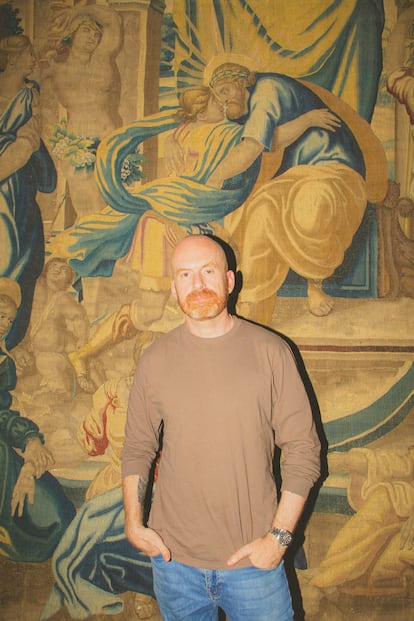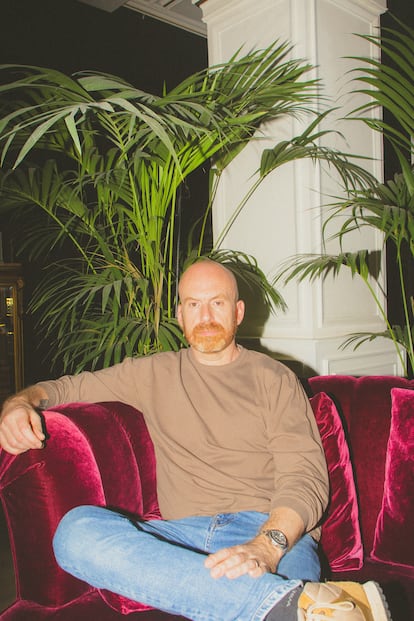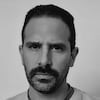Matt Haig: ‘It’s easy to feel ashamed as a Brit when you see mass tourism in Spain’
The British writer, author of the worldwide bestseller ‘The Midnight Library’, has published ‘The Life Impossible,’ a book about the Spanish island where he was on the verge of losing absolutely everything

Matt was a young Englishman in Ibiza doing what young Englishmen do in Ibiza. Partying, drinking, drugs… that was more or less his routine. You couldn’t really say that Matt was a tourist, because that year, 1999, was his third spending a season on the island. But he made the most of every night there as if it were his last. His job allowed him to do that, because he was a waiter, although he wanted to be more than that. In two weeks, he would return to England and decide what to do with his life. Maybe he could be a writer.
That last year, Matt had been writing mystery short stories for the flyers at the party he worked at. And he had discovered that he was good at it. It may not have been the same as writing a real book, but Manumission was a huge party; it sold out Privilege, the largest nightclub in the world. That meant that a lot of people were reading his stories.
That September morning, Matt was pretty calm. He had slept, he was starting to get back to an orderly, healthy life. Maybe that was why he went out for a run at 11 a.m., before it became too hot. He was thinking about going back to England when his world collapsed. Suddenly he was out of breath. There was only pain. He was having a panic attack. He continued having them over the next few days. Everything came crashing down on him. The pain was too much to bear, he wanted to end it all, he wanted to end his life. Matt found it hard to do anything, even get on the plane home. When he did, he promised not to go back to that island. But forgetting Ibiza was not easy: at night he had nightmares, just hearing its name gave him shivers. Ibiza was his Vietnam.
“It may sound a bit over-the-top,” says Matt Haig, 49, in a hotel in the center of Madrid, 25 years after that episode. “But you can put it that way, Ibiza was my Vietnam, in the end that’s how I lived it.”
Haig is in Spain promoting his new book, The Life Impossible. It is his seventh novel for adults and, even so, the writer seems nervous and distrustful. “I feel a bit of pressure because the previous book went quite well,” he explains. Haig is being modest. He knows how to choose adjectives well, but “quite” is not entirely accurate. It would be more correct to say that it went “incredibly well.” The Midnight Library became a literary hit, the kind of book that defines a career. And a life. In the United States, it remained on the bestseller list for more than 100 weeks, and its paperback edition is a constant presence in local bookstores and airport stores. Right now, a film adaptation is underway, although it is in the early stage. Overnight, Haig went from being a moderately well-known writer to a literary star. And that is not always a positive thing.

He began appearing on television and radio programs in England. He was asked about mental health issues, having written about them in Reasons to Stay Alive, an essay in which he reflected on his panic attack and suicidal tendencies. “Suddenly I became a kind of mental health guru, a talk show host. I was just talking about my experience, but it seems I was talking too much because people started to come at me. I had a review in a magazine where they didn’t talk about my book at all, they were criticizing me.”
That’s what happens when you become a literary star. It also happens when you can take a sabbatical year. And that’s exactly what Haig did. He put the brakes on and began a process of therapy, he considered stopping writing to open a bookshop or a sober bar (he had given up alcohol following his experience in Ibiza). But before taking any definitive steps, he decided to face his past. He got on a plane and returned to the place he promised himself he never would.
Haig dedicates The Life Impossible “to the island and the people of Ibiza.” He wrote this dedication because the Spanish island, which once took so much from him, later gave him back something very important: the pleasure of writing. “As soon as I arrived, I started to have ideas for a book,” explains the author. He wrote them down not with the aim of publishing them, but to get out what was inside him, to give the ideas form with words, which is, after all, what he had been doing all his life. “Perhaps that’s why, in some strange way, I didn’t feel any pressure. I was writing for myself, enjoying writing again.”
In the end, it wasn’t just for him. The Life Impossible is one of the big releases of the fall. It tells the story of Grace Winters, an English pensioner who inherits a house in Ibiza. The woman — who is alone, bored and depressed — decides to move to the island to find out why an acquaintance from the past has left her the house. And in this way, she also begins to investigate why they died in strange circumstances. Haig creates a cozy crime novel with magical elements in a paradisiacal environment. The book mixes alien presences, a mysterious DJ, and sailors with secrets. It’s a mix that perfectly follows his previous book: another plot, same underlying theme.
Haig’s books are about desperate people who are given a second chance. This idea is often wrapped up in fantastical elements, such as a magical bookshop that gives readers the chance to live new lives through books or an alien that grants superpowers. But few fantasies are more powerful than the idea of a second chance for a person who seemed doomed. And Haig’s books deal with this theme. Perhaps because his entire life has done so, too.
Haig visited Ibiza in winter, when the clubs close and the island enters a lethargic state. When the tourists disappear and the beaches, cleared of beach bars and towels, invite strolls rather than selfies and dancing. When entire neighborhoods ruled by seasonal tourism become a deserted stage, the setting for a movie that no one will ever film.
This served as inspiration for Haig, but also for reflection. The Life Impossible may be a fantasy book, but it is set against current issues. Overtourism and property speculation hover over the novel and the interview. “Sometimes it is very easy to feel ashamed as a Brit when you see this side of mass tourism in Spain,” the author admits. In fact, one of his aims with this book was to show that Ibiza is more than what is seen in the postcards. “I wanted to encourage my compatriots to understand that the places we visit as tourists are other people’s homes, that they are real and face social problems such as access to housing,” he says.
Haig’s obsession with instilling reality into the fantastical led him to investigate the island’s past. His story is peppered with a variety of references: Nostradamus, Freddie Mercury, the mystic, hermit and exorcist Francisco Palau and even Spanish dictator Francisco Franco. “When you write fantasy, even when you talk about aliens or vampires, you have to believe what you are saying, and so does the reader. So you have to surround fantasy with reality,” he explains.
He also admits that the book makes references to personal experiences, which only he can differentiate from fiction. References to real situations and conversations that he has put into the mouths of characters. “I have written several essays about my experience, very personal books about my mental health. But there are things that you can say more honestly in a novel,” reflects the writer. “That is what I have done in this book. It may be fantasy, but it is emotionally real.”
Sign up for our weekly newsletter to get more English-language news coverage from EL PAÍS USA Edition
Tu suscripción se está usando en otro dispositivo
¿Quieres añadir otro usuario a tu suscripción?
Si continúas leyendo en este dispositivo, no se podrá leer en el otro.
FlechaTu suscripción se está usando en otro dispositivo y solo puedes acceder a EL PAÍS desde un dispositivo a la vez.
Si quieres compartir tu cuenta, cambia tu suscripción a la modalidad Premium, así podrás añadir otro usuario. Cada uno accederá con su propia cuenta de email, lo que os permitirá personalizar vuestra experiencia en EL PAÍS.
¿Tienes una suscripción de empresa? Accede aquí para contratar más cuentas.
En el caso de no saber quién está usando tu cuenta, te recomendamos cambiar tu contraseña aquí.
Si decides continuar compartiendo tu cuenta, este mensaje se mostrará en tu dispositivo y en el de la otra persona que está usando tu cuenta de forma indefinida, afectando a tu experiencia de lectura. Puedes consultar aquí los términos y condiciones de la suscripción digital.









































